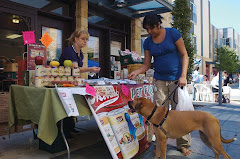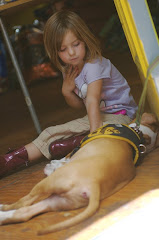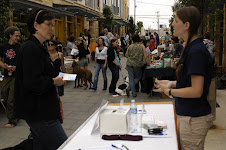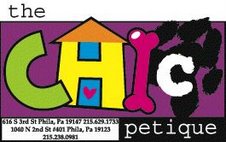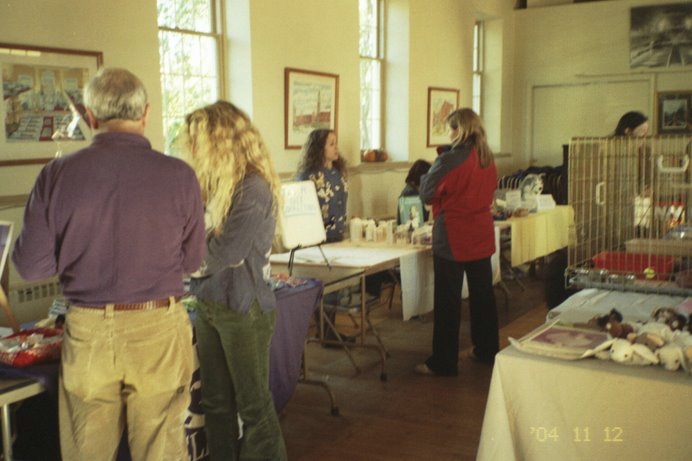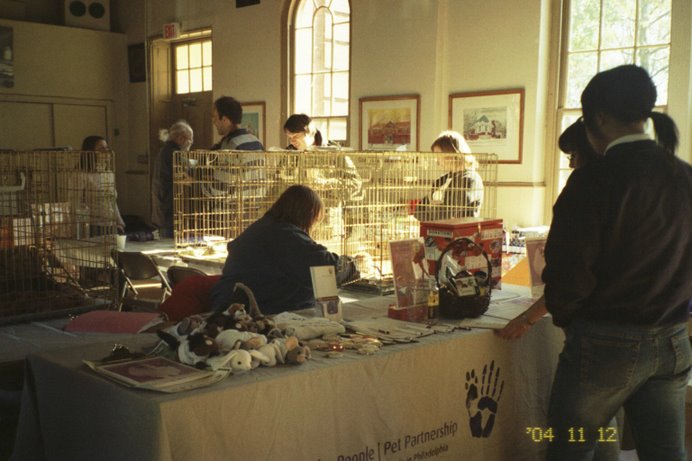Animal Wellness Report
Ten tips for a healthier dog or cat
1. Good food!
A wholesome diet made from ingredients that are as natural and organic as possible is crucial to your dog or cat’s wellness. Choose from a raw frozen or premium canned food and avoid low-end commercial diets that include by-products, high grain content, and artificial additives. Round out his diet with plenty of fresh, pure water. Avoid city tap water – it’s full of chlorine. Use good spring or reverse osmosis water.
2. Vitamins = verve
Your best buddy may also benefit from supplements to boost his wellness. Antioxidants such as vitamins E and C, grape seed extract and CoQ10 are important, as are Omega 3 essential fatty acids, found in salmon and flax oils. Probiotics and digestive enzymes enhance GI health. Consult a holistic vet before starting a supplement program.
3. Don’t overvaccinate
Too many vaccines have been associated with a host of health problems in dogs and cats. Stick with the core vaccines for kittens and puppies and avoid annual boosters. The duration of immunity for core vaccines ranges five to nine years – that’s half a lifetime in most cases! The exception is rabies, which is currently required by law in most regions.
4. Let’s get moving
Regular exercise is as good for your animal as it is for you. It strengthens bones and immunity, oxygenates the blood and organs, and increases mental and emotional well being. Take your dog for a daily walk, or schedule an outdoor playtime. If you have an indoor cat, encourage a few short periods of play throughout the day.
5. Visit the vet
Because your animal can’t talk, he can’t tell you when he’s experiencing unusual symptoms, especially if they’re subtle. Annual veterinary check-ups can catch potential problems before they become serious. It also gives you a regular chance to talk to a professional about the best way to ensure a long and healthy life for your companion.
6. Open wide
A healthy mouth means a healthy body. Gum infections can spread to other body organs and cause serious disease. A proper diet, including raw meaty bones, goes a long way towards good dental health, but it’s also wise to regularly check his teeth and gums for problems, and if necessary, clean his teeth with a holistic dental product for animals.
7. Safe surroundings
A safe, stress-free environment is vital to your animal’s well being at all levels. Avoid using toxic household and lawn care products, including pesticides, and make sure your home and garden don’t pose any safety hazards. Be aware of and remove or minimize any elements or situations that may be causing your dog or cat emotional anxiety.
8. Don’t go hairy
Grooming is something a lot of animal guardians overlook, especially if their companions have short hair. But regular bathing and brushing actually contribute to good health by helping to keep fleas away, getting rid of dirt and dead hair, and preventing skin problems. Brushing also spreads the natural oils over the hair and massages the skin.
9. Training tactics
Just like kids, dogs and cats can develop bad habits if they’re not taught how to behave, and that causes tension for everyone. Make positive training an integral part of your companion’s daily life (consult a professional if you need help). Gentle, reward-based training ensures good behavior and a relationship free of conflict and power games.
10. Lots of love
Last but far from least, your dog or cat needs loads of love and attention. It’s easy to get side-tracked by our jobs and lives, but make sure you spend quality time with your animal every day, petting him, relaxing with him, and telling him how much you appreciate the unconditional love and companionship he gives you. You’ll both benefit!
Thursday, July 19, 2007
Wednesday, July 18, 2007
Reiki Article in Phila Inquirer, July 8, 2007
Try a little reiki
Alternative medicine for furballs with issues
By Meredith Broussard
For The Inquirer
Harlow Whitleigh spends her days gazing out the window of her Fishtown townhouse, eating bonbons and lounging with her best friend, a Yorkshire terrier named Rosco.
Harlow also barks. A small white bichon frise/poodle hybrid, she barks at cars, at the letter carrier, at birds, at customers coming to nearby Johnny Brenda's tavern, and at anyone walking by on the street.
Jeniphur Whitleigh and Michael Pasquarello, who own Harlow and the Loft District's Cafe Lift, have learned to live with Harlow's high-pitched ways. But when Kimberly Fleisher, the director of the Reiki School & Clinic on South Street, offered to try to reduce Harlow's anxiety with a session of reiki, the restaurateurs were happy to see if the Japanese healing method would calm Harlow down.
"She's always been very anxious. She's overanxious about everything," Pasquarello says, as Harlow races back and forth across the living room in a frenzy, jumping on and off the black leather couch.
In a reiki session, the practitioner lays hands on or above the patient in order to direct "ki," a life-force energy, at the area of difficulty and restore proper energy flow and balance. People use reiki as a complementary therapy to treat numerous conditions, including stress, anxiety, chronic pain, and the side effects of chemotherapy and radiation.
Now reiki for pets is catching on. Just as increasing numbers of pet owners have sought out conventional therapies, such as antidepressants and antianxiety drugs, to treat pet-behavior problems, many are turning to alternative medicine for their pets.
Twenty-one percent of pet owners have used some form of complementary medicine on their pets, according to the American Animal Hospital Association's 2003 National Pet Owner Survey. That's up from the 1996 survey, in which only 6 percent of pet owners said they had used alternative therapies on their pets.
Statistics on the number of pets receiving reiki are not available, though Fleisher reports that the number of requests at the Reiki School & Clinic has increased steadily in the last year. The school offers reiki sessions for $40 in the animal's home, where the pet will be most comfortable.
Harlow's reiki session starts slowly. She perches on her owner's lap, her body tensed and taut, snout thrust out in an anxious pose. Fleisher ignores Harlow at first, instead chatting with the dog's owners and petting Rosco.
It's clear why people turn to Fleisher for stress reduction: With her short dark hair and the erect carriage of the serious yoga-trained, the diminutive 31-year-old radiates a sense of calm.
"If there was one thing that you would want to happen as a result of the reiki, what would it be?" she asks.
"We don't want her to be a different dog. She's our dog, and we love her. But for her own sake, I'd like her to calm down a little bit," Pasquarello says.
Still chatting, Fleisher sits on the floor. Harlow tentatively walks over to sniff her, then dashes across the room, scoots back to hop up on the couch behind Fleisher and buzzes from end to end briefly; Rosco climbs on the couch, too, and the dogs begin to wrestle.
Fleisher often works with terminally ill pets - reiki helps the process of letting go, she says - and often comforts the pet and its owner. One of Fleisher's students, reiki master and health educator Sandi Herman, specializes in pet reiki and animal-bereavement counseling.
Herman has eight cats, all of whom love reiki. "My cats usually know it's reiki time. When I'm working on one, everybody else comes over," says Herman, a Bella Vista resident. "They yawn and get really relaxed."
Stressful events such as veterinarian visits, moving, or the introduction of a new pet to the household are often mentioned as reasons that pet owners seek out reiki to relax their pets.
"Animals are closer to nature than we are. They don't wear clothes; they wear their own fur. They're more in tune with energy and nature," says Bette Hanson, who, along with Chic Petique owner Lindsay Condefer, organizes Philadelphia's annual Natural Pet Expo.
Hanson learned about complementary and alternative medical treatments from the Animal Healing Center in Yardley, which also offers pet reiki. Her dog, Sascha, receives a number of holistic therapies for chronic health problems; she received reiki from Fleisher recently during an informal visit.
"Sascha lay down on her side; it was very natural. She was almost asking for it to be done," Hanson says. The next day, she says, Sascha seemed relaxed - much like a person might the day after a massage.
As with many complementary and alternative medicine treatments, there is controversy over reiki's benefits. "Not every patient is going to respond to every treatment. Make sure it's the right thing for your pet," suggests Christina Fuoco, a veterinarian at Queen Village Animal Hospital. "Every pet is different, so speak to your veterinarian about pursuing complementary medicine."
Owners may want to also want to ask their vet if there are any problems that can result from using reiki to treat a pet, especially in the case of serious illness.
Anyone can perform reiki after taking a class, though there are three levels of training; the highest level, which Fleisher holds, is reiki master.
During Harlow's reiki session, Fleisher and Harlow spend some time sitting alone in the living room. Fleisher waits patiently for Harlow to calm down and sit near her. When Harlow pauses, Fleisher reaches over and starts scratching the dog above her right front leg. The dog is instantly blissful; she lifts her chin for more attention, then sits up on her hind legs, offering her belly to be scratched.
Fleisher centers herself briefly, putting her palms together and closing her eyes. To administer the reiki, Fleisher holds Harlow in her lap and cups her hand over the dog's head, passing it back and forth about two inches above Harlow's curly white mop. Fleisher centers most of her attention on Harlow's head; the dog seems to be asking for the reiki there, Fleisher says, as well as on a spot low on her spine.
When her owners return, Harlow greets them leisurely - none of the frantic barking or jumping seen earlier. The dog's face is relaxed, her tongue hanging out, her ears droopy.
"She's warm," Whitleigh comments as she scoops up the dog at the end of the session. Reiki practitioners report that their hands become extremely warm during sessions - Fleisher recalls doing reiki on a fish once, and her hands left sweaty prints on the bowl when she was done.
As Fleisher prepares to leave, Harlow is significantly calmer. She ambles off to take a nap. Is it the reiki, or has she calmed down due to familiarity with the visitor? Hard to say.
But one thing is clear: she isn't barking.
Alternative medicine for furballs with issues
By Meredith Broussard
For The Inquirer
Harlow Whitleigh spends her days gazing out the window of her Fishtown townhouse, eating bonbons and lounging with her best friend, a Yorkshire terrier named Rosco.
Harlow also barks. A small white bichon frise/poodle hybrid, she barks at cars, at the letter carrier, at birds, at customers coming to nearby Johnny Brenda's tavern, and at anyone walking by on the street.
Jeniphur Whitleigh and Michael Pasquarello, who own Harlow and the Loft District's Cafe Lift, have learned to live with Harlow's high-pitched ways. But when Kimberly Fleisher, the director of the Reiki School & Clinic on South Street, offered to try to reduce Harlow's anxiety with a session of reiki, the restaurateurs were happy to see if the Japanese healing method would calm Harlow down.
"She's always been very anxious. She's overanxious about everything," Pasquarello says, as Harlow races back and forth across the living room in a frenzy, jumping on and off the black leather couch.
In a reiki session, the practitioner lays hands on or above the patient in order to direct "ki," a life-force energy, at the area of difficulty and restore proper energy flow and balance. People use reiki as a complementary therapy to treat numerous conditions, including stress, anxiety, chronic pain, and the side effects of chemotherapy and radiation.
Now reiki for pets is catching on. Just as increasing numbers of pet owners have sought out conventional therapies, such as antidepressants and antianxiety drugs, to treat pet-behavior problems, many are turning to alternative medicine for their pets.
Twenty-one percent of pet owners have used some form of complementary medicine on their pets, according to the American Animal Hospital Association's 2003 National Pet Owner Survey. That's up from the 1996 survey, in which only 6 percent of pet owners said they had used alternative therapies on their pets.
Statistics on the number of pets receiving reiki are not available, though Fleisher reports that the number of requests at the Reiki School & Clinic has increased steadily in the last year. The school offers reiki sessions for $40 in the animal's home, where the pet will be most comfortable.
Harlow's reiki session starts slowly. She perches on her owner's lap, her body tensed and taut, snout thrust out in an anxious pose. Fleisher ignores Harlow at first, instead chatting with the dog's owners and petting Rosco.
It's clear why people turn to Fleisher for stress reduction: With her short dark hair and the erect carriage of the serious yoga-trained, the diminutive 31-year-old radiates a sense of calm.
"If there was one thing that you would want to happen as a result of the reiki, what would it be?" she asks.
"We don't want her to be a different dog. She's our dog, and we love her. But for her own sake, I'd like her to calm down a little bit," Pasquarello says.
Still chatting, Fleisher sits on the floor. Harlow tentatively walks over to sniff her, then dashes across the room, scoots back to hop up on the couch behind Fleisher and buzzes from end to end briefly; Rosco climbs on the couch, too, and the dogs begin to wrestle.
Fleisher often works with terminally ill pets - reiki helps the process of letting go, she says - and often comforts the pet and its owner. One of Fleisher's students, reiki master and health educator Sandi Herman, specializes in pet reiki and animal-bereavement counseling.
Herman has eight cats, all of whom love reiki. "My cats usually know it's reiki time. When I'm working on one, everybody else comes over," says Herman, a Bella Vista resident. "They yawn and get really relaxed."
Stressful events such as veterinarian visits, moving, or the introduction of a new pet to the household are often mentioned as reasons that pet owners seek out reiki to relax their pets.
"Animals are closer to nature than we are. They don't wear clothes; they wear their own fur. They're more in tune with energy and nature," says Bette Hanson, who, along with Chic Petique owner Lindsay Condefer, organizes Philadelphia's annual Natural Pet Expo.
Hanson learned about complementary and alternative medical treatments from the Animal Healing Center in Yardley, which also offers pet reiki. Her dog, Sascha, receives a number of holistic therapies for chronic health problems; she received reiki from Fleisher recently during an informal visit.
"Sascha lay down on her side; it was very natural. She was almost asking for it to be done," Hanson says. The next day, she says, Sascha seemed relaxed - much like a person might the day after a massage.
As with many complementary and alternative medicine treatments, there is controversy over reiki's benefits. "Not every patient is going to respond to every treatment. Make sure it's the right thing for your pet," suggests Christina Fuoco, a veterinarian at Queen Village Animal Hospital. "Every pet is different, so speak to your veterinarian about pursuing complementary medicine."
Owners may want to also want to ask their vet if there are any problems that can result from using reiki to treat a pet, especially in the case of serious illness.
Anyone can perform reiki after taking a class, though there are three levels of training; the highest level, which Fleisher holds, is reiki master.
During Harlow's reiki session, Fleisher and Harlow spend some time sitting alone in the living room. Fleisher waits patiently for Harlow to calm down and sit near her. When Harlow pauses, Fleisher reaches over and starts scratching the dog above her right front leg. The dog is instantly blissful; she lifts her chin for more attention, then sits up on her hind legs, offering her belly to be scratched.
Fleisher centers herself briefly, putting her palms together and closing her eyes. To administer the reiki, Fleisher holds Harlow in her lap and cups her hand over the dog's head, passing it back and forth about two inches above Harlow's curly white mop. Fleisher centers most of her attention on Harlow's head; the dog seems to be asking for the reiki there, Fleisher says, as well as on a spot low on her spine.
When her owners return, Harlow greets them leisurely - none of the frantic barking or jumping seen earlier. The dog's face is relaxed, her tongue hanging out, her ears droopy.
"She's warm," Whitleigh comments as she scoops up the dog at the end of the session. Reiki practitioners report that their hands become extremely warm during sessions - Fleisher recalls doing reiki on a fish once, and her hands left sweaty prints on the bowl when she was done.
As Fleisher prepares to leave, Harlow is significantly calmer. She ambles off to take a nap. Is it the reiki, or has she calmed down due to familiarity with the visitor? Hard to say.
But one thing is clear: she isn't barking.
Thursday, July 05, 2007
Pet Expo 2007 -In Pictures
June 10, 2007, Northern Liberties, Philadelphia, PA

The Natural Pet Expo was a success.



Under partly sunny skies, hundreds of attendees sampled, viewed, and talked to over 30 vendors and exhibitors gathered in the shadow of Liberties Walk retailers.

They listening to the beautifully smooth, acoustic sounds of Pete Tramo & WilliamZboy, sampled products, asked questions, won prizes and learned more about holistic & natural care for their animal friends.


The Pennsylvania SPCA brought an assortment of cats and dogs which all soon were adopted and went to new, loving forever homes! They then called for a second assortment to be brought out to the Natural Pet Expo and many MORE were adopted and found new homes!






Participating exhibitors included: Chic Petique, Natures Variety, Whole Foods, Super Dog, Natura/Innova, Primal Pet Foods, Canidae, Aunt Jeni’s Raw Pet Food, Pennsylvania SPCA,


Dr. Jennifer Forsyth - Bethel Mill Animal Hospital, Dr. Wendy Rodriguez - Animal Healing Center, Inc., Dr. Karen Hoffman - Mt. Laurel Animal Hospital, Young Living Essential Oils, Nupro Research, Inc. - pet food supplements, Animal Chiropractics from Christina Fuoco, VMD, The Reiki School and Clinic,
Young Living Essential Oils, Nupro Research, Inc. - pet food supplements, Animal Chiropractics from Christina Fuoco, VMD, The Reiki School and Clinic, 
The Animal-Human Connection, Custom Pet Tags, K-9 Training & Behavioral Therapy, Custom Pet Portraits, Central Bark, Opportunity Barks,

Jane Brydon-Dog Training Coach, Harnessed to Hope Northern Breed Rescue, Inc, Northeast Animal Rescue, Dog Gone Deli, Proper Paws Training, Chez Bow Wow Grooming, Bonejour Pet Store and more…


Throughout the day, attendees enjoyed free pet massages, aromatherapy, reiki,sessions, oil essence treatments, tons of free samples, coupons and raffle prizes were given out to some lucky winners amidst the beautiful acoustic music of Pete Tramo & WilliamZboy.
















Photo's courtesy Mark Gambol & Ed Snyder.

Thanks to our sponsors: Grace Misiti, Natures Variety, Lindsay Condefer, Chic Petique, Brett Mapp, Whole Foods & Bette Hanson, Natural Pet Expo Director.






The Natural Pet Expo was a success.



Under partly sunny skies, hundreds of attendees sampled, viewed, and talked to over 30 vendors and exhibitors gathered in the shadow of Liberties Walk retailers.

They listening to the beautifully smooth, acoustic sounds of Pete Tramo & WilliamZboy, sampled products, asked questions, won prizes and learned more about holistic & natural care for their animal friends.


The Pennsylvania SPCA brought an assortment of cats and dogs which all soon were adopted and went to new, loving forever homes! They then called for a second assortment to be brought out to the Natural Pet Expo and many MORE were adopted and found new homes!






Participating exhibitors included: Chic Petique, Natures Variety, Whole Foods, Super Dog, Natura/Innova, Primal Pet Foods, Canidae, Aunt Jeni’s Raw Pet Food, Pennsylvania SPCA,


Dr. Jennifer Forsyth - Bethel Mill Animal Hospital, Dr. Wendy Rodriguez - Animal Healing Center, Inc., Dr. Karen Hoffman - Mt. Laurel Animal Hospital,
 Young Living Essential Oils, Nupro Research, Inc. - pet food supplements, Animal Chiropractics from Christina Fuoco, VMD, The Reiki School and Clinic,
Young Living Essential Oils, Nupro Research, Inc. - pet food supplements, Animal Chiropractics from Christina Fuoco, VMD, The Reiki School and Clinic, 
The Animal-Human Connection, Custom Pet Tags, K-9 Training & Behavioral Therapy, Custom Pet Portraits, Central Bark, Opportunity Barks,

Jane Brydon-Dog Training Coach, Harnessed to Hope Northern Breed Rescue, Inc, Northeast Animal Rescue, Dog Gone Deli, Proper Paws Training, Chez Bow Wow Grooming, Bonejour Pet Store and more…


Throughout the day, attendees enjoyed free pet massages, aromatherapy, reiki,sessions, oil essence treatments, tons of free samples, coupons and raffle prizes were given out to some lucky winners amidst the beautiful acoustic music of Pete Tramo & WilliamZboy.
















Photo's courtesy Mark Gambol & Ed Snyder.

Thanks to our sponsors: Grace Misiti, Natures Variety, Lindsay Condefer, Chic Petique, Brett Mapp, Whole Foods & Bette Hanson, Natural Pet Expo Director.





Friday, April 27, 2007
NATURAL PET EXPO - June 10, 2007

This years NATURAL PET EXPO will take place in Philadelphia, PA from 10am to 4pm at 1040 N 2nd Street in the courtyard of the Liberties Walk complex in Northern Liberties.
The theme this year is PET FOOD & NUTRITION.
Starting at NOON - hear LIVE MUSIC from acoustic and folk/blues artists Pete Tramo and Williamzboy. Check out their musical offerings at www.myspace.com/octobertreeproject and www.myspace.com/folkabilly
At 1pm, Veterinarian Jennifer Forsyth, V.M.D from Bethel Mill Animal Hospital will give a talk on the Pet Food Recall -- Making the Right Choices for Your Pet. Find out exactly what to look for and what to avoid on pet food labels and how to pick the best food for your pet. Is raw food the best alternative? Dr. Forsyth will talk about the benefits, weigh the costs versus the time and give you THE answers you need to make informed and -safe- decisions for your pet. You won't want to miss this. NEXT, Dr. Karen Hoffman, from Mt. Laurel Animal Hospital will give a talk on "Safe Alternatives to NSAIDS/Aspirin" and "The Importance of Animal Dentistry"
 See what else you'll find at the Natural Pet Expo!
See what else you'll find at the Natural Pet Expo! + PET FOOD AND NUTRITION Find out what food is BEST (and worst) for your pet!
+ ARE VACCINATIONS DANGEROUS? Evaluate true risk of exposure – get informed.
+ HOMEOPATHIC & HOLISTIC CARE What is it and what are the benefits for your pet?
+ ALTERNATIVE CARE Learn about Reiki, Pet Massage, Acupuncture, Chiropractics, Flower Essences, Young Living Oils, Amazon Herbs and other all-natural care and health options.
+ ALL- NATURAL FLEA REMEDIES, BEST SELLING BOOKS, TREATS, TOYS AND MUCH MORE!
BE PROACTIVE AND RESPONSIBLE -- Talk to the experts and get the REAL scoop on the safety of commercial pet foods, learn about alternative health care and how to recognize the benefits & limitations of conventional and holistic options for your animal companion.
Our Sponsors this year are Chic Petique pet stores, dedicated to the natural care and wellness of your pet and serving you in two convenient locations, 3rd & South Streets and 1040 N. 2nd Street in the Liberties Walk retail Courtyard in Northern Liberties. Coming back for a 2nd year is
 NATURE'S VARIETY The Nature's Variety line of natural pet products was developed by families who have been engaged in sustainable production agriculture for over 140 years - raising quality livestock and growing crops in America's heartland. They are passionate about improving the health of your pet through better nutrition. With better ingredients and better nutrition, you can help your pet maintain proper body weight, reduce the risk of allergies, and enjoy a longer, healthier life by maintaining a healthy diet. They select the highest quality ingredients for the production of nutritionally dense and bio-available diets anhttp://www.blogger.com/img/gl.link.gifd treats. Their natural, nutritious products are produced with integrity and care for the health of your companion animal.
NATURE'S VARIETY The Nature's Variety line of natural pet products was developed by families who have been engaged in sustainable production agriculture for over 140 years - raising quality livestock and growing crops in America's heartland. They are passionate about improving the health of your pet through better nutrition. With better ingredients and better nutrition, you can help your pet maintain proper body weight, reduce the risk of allergies, and enjoy a longer, healthier life by maintaining a healthy diet. They select the highest quality ingredients for the production of nutritionally dense and bio-available diets anhttp://www.blogger.com/img/gl.link.gifd treats. Their natural, nutritious products are produced with integrity and care for the health of your companion animal. And joining us in 2007 as a new sponsor is WHOLE FOODS!

Whole Foods believe in a virtuous circle entwining the food chain, human beings and Mother Earth: each is reliant upon the others through a beautiful and delicate symbiosis.
Whole Foods obtains products locally and from all over the world, often from small, uniquely dedicated food artisans. They strive to offer the highest quality, least processed, most flavorful and naturally preserved foods. Why? Because food in its purest state — unadulterated by artificial additives, sweeteners, colorings and preservatives — is the best tasting and most nutritious food available. Whole Foods also believe companies, like individuals, must assume their share of responsibility as tenants of Planet Earth.
The Natural Pet Expo team offers infinite gratitude & thanks our sponsors for all their generous support of our cause!
Thursday, April 19, 2007
NATURAL PET EXPO - JUNE 10, Philadelphia, PA

ANIMAL LOVERS, ADVOCATES AND ENTHUSIASTS DEDICATED TO THE HEALTH & WELFARE OF PETS -- PLEASE JOIN US FOR THE 4th ANNUAL NATURAL PET EXPO – SUNDAY, JUNE 10, 2007 at Liberties Walk in Philadelphia, PA. from 10am to 4pm. RAIN OR SHINE.
As an animal enthusiast, you may or may not be shocked by the recent Pet Food Recall. Our sympathies are with the pet parents who are dealing with the heartache of this situation and our hearts go out to any and all who may have suffered as a result. While the media played it's part in getting out the message, it has not done enough in covering the full and true story out...
Four years ago, Chic Petique joined with Bette Hanson to help educate others on natural pet care, founding the Natural Pet Expo with their primary topic ‘the dangers of feeding commercial grade pet food’. With the plight of thousands, and thousands of pets affected by tainted pet food recently in the news, it is more important than ever to get the word out about healthier choices in the care and welfare of our animal companions. Please join us for the NEXT Natural Pet Expo on Sunday, June 10, in Northern Liberties, Philadelphia, PA
Excerpt from Ann Martin’s “Foods Pet Die For” 1997 Sage Press "There are several reasons you really do not want to feed your dog or cat commercial foods. Perhaps the most compelling moral reason is that there are rendered, euthanized pets in much of this food. These pets have been mixed with other materials, including some condemned for human consumption: "rotten meat from supermarket shelves, restaurant grease..'4-D' (dead, diseased, dying and disabled) animals and roadkill."
In addition, two thirds of the pet food manufactured in the United States contains added preservatives, according to the Animal Protection Institute. There are also coloring agents, emulsifiers, lubricants, flavoring agents, pH control agents, synergists and solvents. "Of the more than 8,600 recognized food additives today, no toxicity information is available for 46% of them," the institute says.
EQ (ethoxyquin) is the most common antioxidant preservative in pet foods. It has been found in some dogs' livers and tissues months after the animal stopped ingesting it. Ethoxyquin is manufactured by Monsanto Chemical, the largest manufacturer of
bioengineered foods. EQ is listed as a hazardous chemical by the Occupational Safety and Health Administration (OSHA) and is considered a pesticide by the USDA. It is used in most US dog food, but is banned in Europe. The FDA's Center for Veterinary Medicine requested that pet food manufacturers voluntarily reduce the maximum level for ethoxyquin by half to 75 parts per million. Courtesy of 'New Living' Newspaper March 2001
NONE of this is good for your pets, help us continue our mission to get the word out! Our last big event was extremely successful and generated quite a buzz. Both Lindsay and I heard feedback from many attendees who were inspired, influenced, intrigued and informed by the strength of the content. Many have approached us all year asking again and again - "when is the next one?"
At the 4th annual Natural Pet Expo you can learn from the experts about what food is SAFE to feed your pet, holistic and homeopathic remedies, complete nutrition, commercial raw food vs making your own, alternative care modalities like Reiki and acupuncture, natural flea & tick remedies, the latest pet books and more!
Founded in 2004, the Natural Pet Expo’s goal is to gather together leading pet experts, veterinarians, animal advocates, nutritionists, alternative care specialists and animal lovers of all kinds to help educate and inform YOU the pet owner. By providing a friendly and open forum -- you are welcome to explore, gather facts, ask questions and get one-on-one advice. In this way, common myths are debunked, valuable information is shared and you can make responsible decisions and actively participate in your pet’s well being.
Our mission is simple:
• We aspire to follow, gather and provide the latest information and data on natural health choices, alternative care and nutrition for pets and provide access to this information in a practical, clear and easy to understand friendly forum.
• Our goal is to educate, inform, debunk myths and increase awareness, inspiring health conscious individuals to take responsibility for their pets’ well being, strengthening and allowing that special bond to grow between human and animal.
Run by volunteers, the first Natural Pet Expo took place in November, 2004 and involved over a dozen wellness-related animal health care providers, advocates and businesses relates to natural and organic pet care.
In 2005 and 2006, the Natural Pet Expo continued our quest to increase awareness about healthy pet care, health and nutrition. We added an informative Resource Booklet loaded with articles and information.
Our mission is a big one. Just one company, Ralston Purina makes more than 4 billion dollars in profit off of dog owners a year! Much time, effort and advertising dollars are spent misinforming the consumer. The pet food recall has brought to light the dangers carried in commercial pet food to the public eye. Now is the time to act when interest and a search for knowledge is at the forefront. Please join us in helping spread the word about our grassroots effort to bring even more awareness on more natural choices to the pet consumer.
Please join us at the 4th annual event on Sunday, June 10 from 10-4pm at the Liberties Walk location of pet store Chic Petique in Northern Liberties, Philadelphia. Call 215.238.0981 or email me here for more information!
Bigger than you think: The story behind the pet food recall

YOUR WHOLE PET
Bigger than you think: The story behind the pet food recall
By Christie Keith, Special to SF Gate
The March 16 recall of 91 pet food products manufactured by Menu Foods wasn't big news at first. Early coverage reported only 10-15 cats and dogs dying after eating canned and pouched foods manufactured by Menu. The foods were recalled -- among them some of the country's best-known and biggest-selling brands -- and while it was certainly a sad story, and maybe even a bit of a wake-up call about some aspects of pet food manufacturing, that was about it.
At first, that was it for me, too. But I'm a contributing editor for a nationally syndicated pet feature, Universal Press Syndicate's Pet Connection, and all of us there have close ties to the veterinary profession. Two of our contributors are vets themselves, including Dr. Marty Becker, the vet on "Good Morning America." And what we were hearing from veterinarians wasn't matching what we were hearing on the news.
When we started digging into the story, it quickly became clear that the implications of the recall were much larger than they first appeared. Most critically, it turned out that the initially reported tally of dead animals only included the cats and dogs who died in Menu's test lab and not the much larger number of affected pets.
Second, the timeline of the recall raised a number of concerns. Although there have been some media reports that Menu Foods started getting complaints as early as December 2006, FDA records state the company received their first report of a food-related pet death on February 20.
One week later, on February 27, Menu started testing the suspect foods. Three days later, on March 3, the first cat in the trial died of acute kidney failure. Three days after that, Menu switched wheat gluten suppliers, and 10 days later, on March 16, recalled the 91 products that contained gluten from their previous source.
Nearly one month passed from the date Menu got its first report of a death to the date it issued the recall. During that time, no veterinarians were warned to be on the lookout for unusual numbers of kidney failure in their patients. No pet owners were warned to watch their pets for its symptoms. And thousands and thousands of pet owners kept buying those foods and giving them to their dogs and cats.
At that point, Menu had seen a 35 percent death rate in their test-lab cats, with another 45 percent suffering kidney damage. The overall death rate for animals in Menu's tests was around 20 percent. How many pets, eating those recalled foods, had died, become ill or suffered kidney damage in the time leading up to the recall and in the days since? The answer to that hasn't changed since the day the recall was issued: We don't know.
We at Pet Connection knew the 10-15 deaths being reported by the media did not reflect an accurate count. We wanted to get an idea of the real scope of the problem, so we started a database for people to report their dead or sick pets. On March 21, two days after opening the database, we had over 600 reported cases and more than 200 reported deaths. As of March 31, the number of deaths alone was at 2,797.
READ THE REST OF THE ARTICLE HERE...
Christie Keith is a contributing editor for Universal Press Syndicate's Pet Connection and past director of the Pet Care Forum on America Online. She lives in San Francisco.
Do You REALLY Know What is in Your Pets Food?

ANIMAL HEALTH & WELFARE:
Although you may think all pet food manufacturers have your pet’s best interests in mind, this is not always the case. Current pet food regulations allow manufacturers to use ingredients that you would never knowingly give to your pet. In fact, you may be shocked to learn what some brands of pet food really contain. For example: the use of by-products (feet, bones and intestines, etc.), chemical preservatives (BHA and BHT) and grains that are often difficult to digest (corn, wheat, gluten and soy), which are often used as a protein source instead of meat.
Subscribe to:
Comments (Atom)




